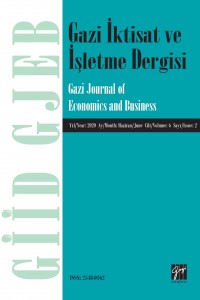Öz
In this study, the differentiation of consumption preferences of Manisa notables according to their educational status is examined. Consuming and performing self through consumed products is one of the most basic behavioral patterns of the era. In other words, consumption has a symbolic value in determining class positions in society. To be distinguished, it is necessary to adopt an elite lifestyle and show this elite life style to the others and to those who share the same class positions. At this point, consumption behavior is quite useful for individuals. What role do individuals' consumption preferences have for reflecting this status position for a group that already has status? At this point which products will be consumed is the determiner. Education is an important determinant especially for families who want to maintain their status. In this study, the effect of education level of notable families on consumption preferences is examined. Significant differences are observed between two generations of Manisa notables in terms of education level. The effect of the status positions of these notable family generations at different educational backgrounds are examined and as a result, it is visible that such effect over consumption preferences does exist. Rising personal education levels is a status symbol for notable families. We have encountered results such as the fact that the difference of education levels between two generations of notable families also makes difference about their consumption preferences. These new findings confirm the idea that cultural capital is an important factor over consumption preferences.
Anahtar Kelimeler
Kaynakça
- Balkan, E. & Rutz, H. (2016). Sınıfın Yeniden Üretimi. İstanbul: H2O Kitap.
- Bauman, Z. (2004). Work, Consumerism and The New Poor. New York: McGraw-Hill Education.
- Bilgin, N. (2011). Eşya ve İnsan, İstanbul: Gündoğan Yayınları.
- Bourdieu, P. (1986). “The Forms of Capital”, in: Richardson, J. (ed.) Handbook of Theory and Research for the Sociology of Education. Westport, CT: Greenwood Press.
- Bourdieu, P. (1989). Distinction a Social Critique of The Judgement of Taste. London: Routledge.
- Bourdieu, P. and Wacquant, L. (2016). Düşünümsel Bir Antropoloji İçin Cevaplar. İstanbul: İletişim Yayınları.
- De Certeau, M. (2009). Gündelik Hayatın Keşfi I. (Çev. Lale Aslan Özcan), Ankara: Dost Yayınevi.
- Göker, E. (2010). Ekonomik İndirgemeci mi Dediniz?. In G. Çeğin, E. Göker, A. Arlı, & Ü. Tatlıcan (Ed.). Ocak ve Zanaat: Pierre Bourdieu Derlemesi(1st.ed., pp. 277-303). İstanbul: İletişim Yayınları.
- Kıray, M. B. (2005). Tüketim Normları Üzerine Karşılaştırmalı Bir Araştırma. İstanbul: Bağlam Yayıncılık.
- Mackay, H. (1997), Consumption and Everyday Life. London: Sage Press.
- Odabaşı, Y. (2013). Tüketim Kültürü: Yetinen Toplumdan Tüketen Topluma. İstanbul: Sistem Yayıncılık.
- Todd, D. (2012). You Are What You Buy: Postmodern Consumerism and the Construction of Self. Hawaii: University of Hawai‘i at Hilo · Hawai‘i Community College.
- Türk Dil Kurumu. (2005). Türkçe Sözlük. Ankara: Türk Dil Kurumu Yayınları.
- Veblen, T. (2005). Conspicuous Consumption. New York: Penguin Books, Great Ideas, Penguin Group.
- Warde, A. (1996). Consumption Matters: The Production and Experience of Consumption. Cambridge: Blackwell Publishers.
- Warde, A. (2005). Consumption and Theories of Practice. Journal of Consumer Culture, 5 (2), 131-153.
Öz
Anahtar Kelimeler
Kaynakça
- Balkan, E. & Rutz, H. (2016). Sınıfın Yeniden Üretimi. İstanbul: H2O Kitap.
- Bauman, Z. (2004). Work, Consumerism and The New Poor. New York: McGraw-Hill Education.
- Bilgin, N. (2011). Eşya ve İnsan, İstanbul: Gündoğan Yayınları.
- Bourdieu, P. (1986). “The Forms of Capital”, in: Richardson, J. (ed.) Handbook of Theory and Research for the Sociology of Education. Westport, CT: Greenwood Press.
- Bourdieu, P. (1989). Distinction a Social Critique of The Judgement of Taste. London: Routledge.
- Bourdieu, P. and Wacquant, L. (2016). Düşünümsel Bir Antropoloji İçin Cevaplar. İstanbul: İletişim Yayınları.
- De Certeau, M. (2009). Gündelik Hayatın Keşfi I. (Çev. Lale Aslan Özcan), Ankara: Dost Yayınevi.
- Göker, E. (2010). Ekonomik İndirgemeci mi Dediniz?. In G. Çeğin, E. Göker, A. Arlı, & Ü. Tatlıcan (Ed.). Ocak ve Zanaat: Pierre Bourdieu Derlemesi(1st.ed., pp. 277-303). İstanbul: İletişim Yayınları.
- Kıray, M. B. (2005). Tüketim Normları Üzerine Karşılaştırmalı Bir Araştırma. İstanbul: Bağlam Yayıncılık.
- Mackay, H. (1997), Consumption and Everyday Life. London: Sage Press.
- Odabaşı, Y. (2013). Tüketim Kültürü: Yetinen Toplumdan Tüketen Topluma. İstanbul: Sistem Yayıncılık.
- Todd, D. (2012). You Are What You Buy: Postmodern Consumerism and the Construction of Self. Hawaii: University of Hawai‘i at Hilo · Hawai‘i Community College.
- Türk Dil Kurumu. (2005). Türkçe Sözlük. Ankara: Türk Dil Kurumu Yayınları.
- Veblen, T. (2005). Conspicuous Consumption. New York: Penguin Books, Great Ideas, Penguin Group.
- Warde, A. (1996). Consumption Matters: The Production and Experience of Consumption. Cambridge: Blackwell Publishers.
- Warde, A. (2005). Consumption and Theories of Practice. Journal of Consumer Culture, 5 (2), 131-153.
Ayrıntılar
| Birincil Dil | Türkçe |
|---|---|
| Bölüm | Makaleler |
| Yazarlar | |
| Yayımlanma Tarihi | 15 Haziran 2020 |
| Yayımlandığı Sayı | Yıl 2020 Cilt: 6 Sayı: 2 |


